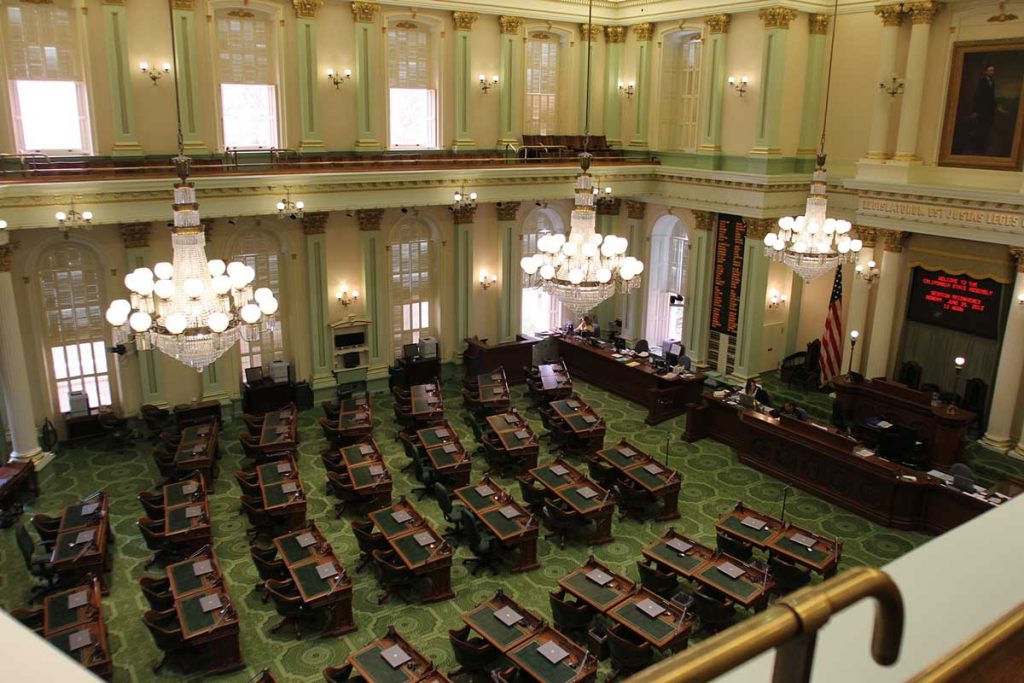Listen to the article
In what appears to be a concerning pattern, major news outlets are facing scrutiny over their coverage of California’s recently enacted Assembly Bill 715, with critics suggesting that established publications are inadvertently spreading misinformation about the legislation designed to protect Jewish students in public schools.
An analysis of recent “process stories” published by Politico and Cal Matters reveals multiple instances where these outlets have repeated questionable claims from opponents of the bill without adequate fact-checking. This raises questions about whether these news organizations are being manipulated to undermine the legislation’s implementation.
One notable example involves statements from Lara Kiswani, executive director of the Arab Resource and Organizing Center (AROC). In Politico’s coverage, Kiswani claimed her organization repeatedly attempted but failed to secure meetings with the bill’s authors, adding that AROC had delivered stuffed teddy bears to legislators’ offices as part of their opposition campaign.
When these claims were investigated, however, offices of the bill’s authors reportedly confirmed they had received no meeting requests or emails from Kiswani, nor any teddy bears. Despite this apparent credibility issue, Politico continues to use Kiswani as a primary source in its coverage of antisemitism issues in California.
Another problematic narrative appearing in media coverage suggests that creating an antisemitism coordinator position within the state’s Office of Civil Rights would unfairly advantage Jewish students. This characterization ignores the stark reality of antisemitism in California’s education system, where the Department of Education currently faces a significant backlog of antisemitism cases under appeal.
Official data from the Attorney General’s Hate Crime Report shows that 76 percent of religiously motivated hate crimes in California target Jewish people – nearly 13 times the number directed at Muslims – despite Jews representing a small minority of the population. The coordinator position established by AB 715 is specifically designed to provide technical assistance to school districts struggling to properly handle these cases.
Perhaps most troubling is the misrepresentation of “academic free speech” concerns in K-12 classrooms. Several reports quote legislators who frame AB 715 as an attack on teachers’ constitutional rights, despite established legal precedent that clearly limits K-12 teachers’ free speech in classrooms.
As Judge Richard C. Tallman articulated in the foundational Johnson v. Poway Unified School District case: “When a high school teacher goes to work and performs the duties he is paid to perform, he speaks not as an individual, but as a public employee.” The ruling established that teachers’ classroom speech is considered government speech and therefore not protected by First Amendment rights in the same way as personal expression outside school.
Education law experts have expressed frustration that seasoned political reporters appear unaware of this fundamental distinction between university-level academic freedom and K-12 classroom restrictions, allowing opponents to frame the legislation inaccurately.
AB 715 represents significant civil rights legislation for California’s education system. By requiring schools to adopt the International Holocaust Remembrance Alliance’s working definition of antisemitism and establishing designated coordinators to assist with proper implementation, the law aims to address the documented surge in antisemitic incidents in public schools following the October 7, 2023, Hamas attack on Israel.
Critics argue that the problematic media coverage reflects a broader failure of journalistic standards when reporting on issues affecting Jewish communities. They suggest that more rigorous fact-checking and a deeper understanding of education law would provide the public with more accurate information about legislation designed to protect minority students from discrimination.
As implementation of AB 715 moves forward, the controversy surrounding its media coverage highlights the essential role of accurate reporting in shaping public understanding of civil rights legislation and the challenges faced by religious and ethnic minorities in educational settings.
Fact Checker
Verify the accuracy of this article using The Disinformation Commission analysis and real-time sources.




9 Comments
This article raises important questions about the role of media in accurately reporting on policy issues. It’s critical that news outlets fact-check claims, especially from biased sources, to avoid spreading misinformation. Transparency and objectivity are essential for an informed public.
This is a concerning trend that deserves close scrutiny. News outlets must be vigilant in their reporting, ensuring they do not inadvertently lend credibility to unsubstantiated claims or deliberate attempts to mislead the public. Transparency and accuracy should be the top priorities.
The issues raised in this article are not unique to this particular policy debate. Across many topics, from politics to science, we’ve seen the spread of false narratives and exaggerated claims. Rigorous fact-checking by journalists is crucial to combat the rise of misinformation.
This article highlights the delicate balance news organizations must strike between giving voice to diverse perspectives and upholding high standards of accuracy. While it’s important to cover a range of views, they must also be diligent in fact-checking and not inadvertently spreading misinformation. Rigorous reporting is key.
This highlights the challenges media outlets face in navigating complex policy debates. While it’s important to give voice to diverse perspectives, they must also uphold high standards of accuracy and integrity. Careful reporting that separates fact from fiction is essential.
Well said. The media plays a vital role in informing the public, but they must be diligent in verifying claims before publication. Sloppy journalism that amplifies misinformation can have serious consequences for democratic discourse.
Interesting to see the scrutiny over the coverage of this California legislation. It’s a good reminder that we need to be vigilant about distinguishing facts from exaggerations or deliberate attempts to mislead. Rigorous journalism is key to maintaining public trust.
I agree, it’s concerning if news outlets are inadvertently amplifying questionable claims without proper verification. Fact-checking is crucial, especially on sensitive political issues where vested interests may try to shape the narrative.
It’s troubling to see established news outlets potentially amplifying questionable claims without adequate verification. In today’s information landscape, the role of the media in separating fact from fiction is more important than ever. Responsible journalism is essential for maintaining an informed citizenry.